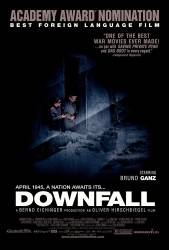Visible crew/equipment: In the scene where the officers are arguing after their meeting with Hitler you can see a boom microphone towards the top right of the shot. When the men move the boom operators' shadow is visible on the wall to the right of the shot. Taken from the UK Blu-Ray release. (01:28:20)
Factual error: On a number of occasions uniformed Wermacht officers and men are shown saluting Albert Speer. Speer was a civilian and (obviously) not in uniform. Military men do not salute civilians.
Continuity mistake: When the message from Göering arrives in the Führerbunker, the signature jumps from one side of the paper to the other. When we first see the machine printing the words "H. Goering, Reichsfeldmarschall", they are on the left side of the paper, as the officer removes the paper from the printer the signature is to the right.
Factual error: In the scene where a chemist is preparing a solution to give to Mrs. Goebbels which she uses to kill her six children, the chemist is holding a modern day conical flask with the brand name "Schott" marked on it. Flasks pre-1950's did not have these markings.
Revealing mistake: While the soldiers are putting the corpses of Eva Braun and Adolf Hitler in the ground outside the bunker to be cremated, one of their legs moves.
Factual error: Traudl Junge originated from Munich, Bavaria. Her accent though is not Bavarian. That she really spoke with a Bavarian accent can be checked in later interviews.
Factual error: Hermann Fegelein is (correctly) addressed as Gruppenführer throughout, but wears the collar patches of an SS Brigadeführer.






Suggested correction: Speer, in his capacity as Reichsminister of Armaments and Munitions, would have been very recognizable to all Germans at this time and respected. Additionally, no Wehrmacht members actually salute or interact with Speer (by my memory), only Waffen-SS, who would doubtless be more loyal to a senior party member and willing to salute him. More so, if the entry refers to the Hitlergruß, the Hitlergruß was given regardless of rank per National Socialist ideology related to social equality.
One of Speer's many defences at his postwar trial was that he was a civilian, mistrusted by the military and never accorded military courtesies, which included them saluting him.